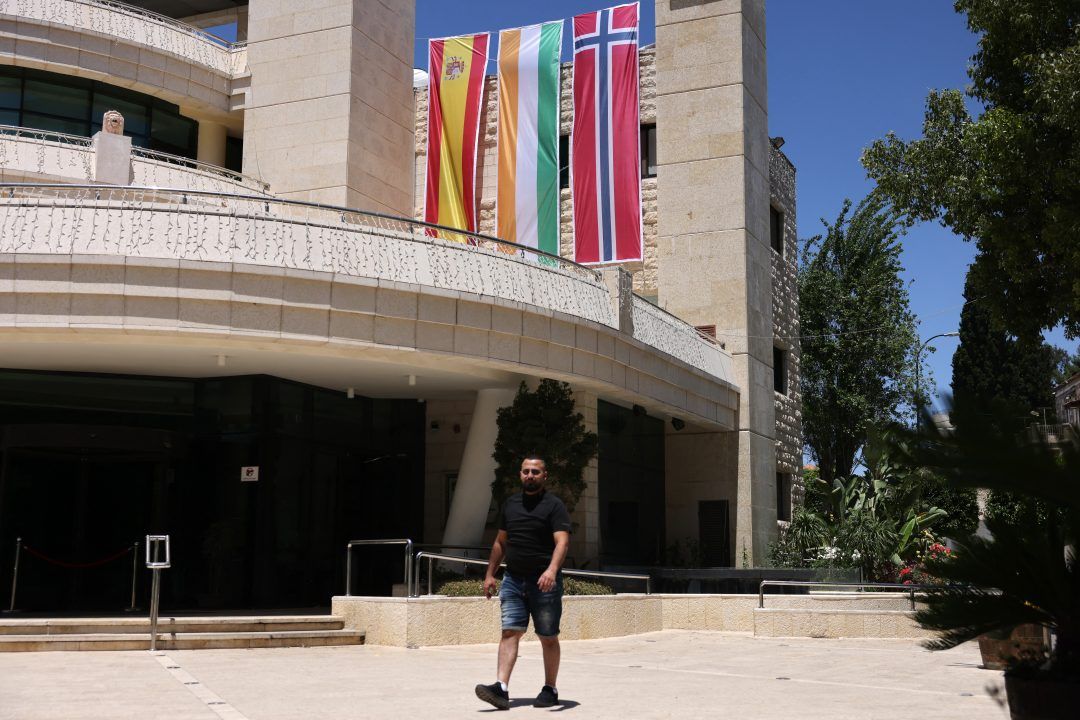- Home
- War in the Middle East
- Spain, Ireland and Norway Recognize Palestine

©AHMAD GHARABLI / AFP
Spain, Ireland and Norway will formally recognize a Palestinian state on Tuesday.
The three European countries believe that their initiative has strong symbolic impact, which will likely encourage others to follow suit.
They also point to Norway and Spain's historic role in advancing Israel-Palestinian peace efforts: in 1991, the two sides sat down together for the first time at a Madrid peace conference that paved the way for the 1993 Oslo Accords.
"Recognizing the state of Palestine is about justice for the Palestinian people," Spanish Foreign Minister Jose Manuel Albares said on Monday in Brussels.
It was also "the best guarantee of security for Israel and absolutely essential for reaching peace in the region," he said alongside his Irish and Norwegian counterparts.
The plans were unveiled last week in a coordinated announcement by their prime ministers, with formal recognition to take place in all three countries on Tuesday.
Norway informed Palestinian Prime Minister Mohammed Mustafa during the weekend that its recognition would also take effect on Tuesday.
Although Slovenia also started the process of recognizing a Palestinian state, the issue provoked sharp disagreement within the 27-nation European Union.
For decades, formal recognition of a Palestinian state was seen as the endgame of a negotiated peace between Israelis and Palestinians.
Most Western European nations said that they are willing to recognize Palestinian statehood, but not before agreement on thorny issues like the status of Jerusalem and final borders.
Within the EU, states like France believe it is not the right time to do so, while Germany only envisages recognition following negotiations between the two sides.
In 2014, Sweden became the first EU member to recognize a Palestinian state, following six other European countries that took the step before joining the bloc: Bulgaria, Cyprus, the Czech Republic, Hungary, Poland and Romania.
Israel's Foreign Minister Israel Katz told Spain's consulate in Jerusalem to stop offering consular services to Palestinians from June 1 as a "punitive" measure.
On Saturday, Spain's Defense Minister Margarita Robles accused Israel of committing "a real genocide" in Gaza.
Until now, such language had only been heard from far-left ministers of the coalition government, but not from the Socialist party.
Hazel Ward, Pierre-Henry Deshayes and Peter Murphy, with AFP
The three European countries believe that their initiative has strong symbolic impact, which will likely encourage others to follow suit.
They also point to Norway and Spain's historic role in advancing Israel-Palestinian peace efforts: in 1991, the two sides sat down together for the first time at a Madrid peace conference that paved the way for the 1993 Oslo Accords.
"Recognizing the state of Palestine is about justice for the Palestinian people," Spanish Foreign Minister Jose Manuel Albares said on Monday in Brussels.
It was also "the best guarantee of security for Israel and absolutely essential for reaching peace in the region," he said alongside his Irish and Norwegian counterparts.
The plans were unveiled last week in a coordinated announcement by their prime ministers, with formal recognition to take place in all three countries on Tuesday.
View this post on Instagram
Differences Within the EU
Norway informed Palestinian Prime Minister Mohammed Mustafa during the weekend that its recognition would also take effect on Tuesday.
Although Slovenia also started the process of recognizing a Palestinian state, the issue provoked sharp disagreement within the 27-nation European Union.
For decades, formal recognition of a Palestinian state was seen as the endgame of a negotiated peace between Israelis and Palestinians.
Most Western European nations said that they are willing to recognize Palestinian statehood, but not before agreement on thorny issues like the status of Jerusalem and final borders.
Within the EU, states like France believe it is not the right time to do so, while Germany only envisages recognition following negotiations between the two sides.
In 2014, Sweden became the first EU member to recognize a Palestinian state, following six other European countries that took the step before joining the bloc: Bulgaria, Cyprus, the Czech Republic, Hungary, Poland and Romania.
Israel's Foreign Minister Israel Katz told Spain's consulate in Jerusalem to stop offering consular services to Palestinians from June 1 as a "punitive" measure.
On Saturday, Spain's Defense Minister Margarita Robles accused Israel of committing "a real genocide" in Gaza.
Until now, such language had only been heard from far-left ministers of the coalition government, but not from the Socialist party.
Hazel Ward, Pierre-Henry Deshayes and Peter Murphy, with AFP
Read more



Comments